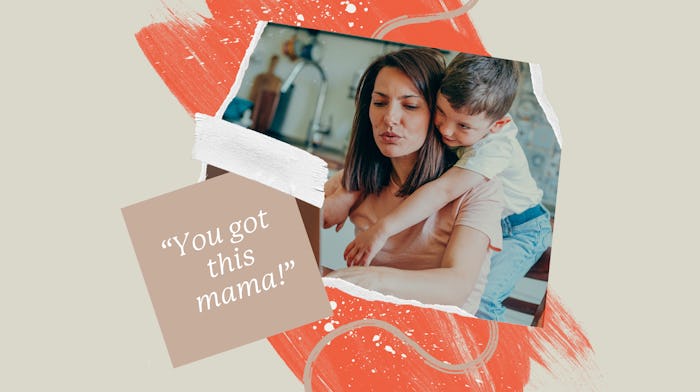Life

The Major Problem With Turning The School Reopening Debate Into A Mom-Shaming Issue
If you belong to a mommy Facebook group or follow any mom influencers on Instagram, you’ve probably seen a version of this popular post about returning to school amid the coronavirus pandemic. It goes a little something like this: Hey mama. Whether you’re sending your kids to school in-person, doing distance learning, or homeschooling, you’re making the right decision for your family.
Objectively, that sounds pretty encouraging. After all, anything that discourages mom-shaming is undoubtedly born from good intentions. Moms are shamed by society, by non-parents, and, perhaps worst of all, by each other all the time for the most innocuous of reasons. Nearly every topic in the parenting sphere is up for debate in some fashion, and mom-centric social media spaces are frequently a breeding ground for arguments. (Just mention sleep training in any mommy Facebook group and watch the comment section go up in flames.) It’s no surprise that many of those online communities have come down hard against mom-shaming, and it’s certainly worth noting that the overall cruelty towards one another about family decisions should definitely stop.
The fact that parents are left to make their own decisions about how to handle the school year, that schools are even opening at all amid an ongoing pandemic is indicative of a larger problem: a lack of governmental leadership and virtually no cohesive directive for how to mitigate risk in our day-to-day lives.
Except... the conversation about reopening schools isn’t one of those situations. Or, at least, it shouldn’t be. The fact that parents are left to make their own decisions about how to handle the school year, that schools are even opening at all amid an ongoing pandemic is indicative of a larger problem: a lack of governmental leadership and virtually no cohesive directive for how to mitigate risk in our day-to-day lives.
To be sure, parents are at a difficult crossroads right now. Sending children to school for in-person learning is not without risk. Some states that have already opened schools are seeing an increase in outbreaks, and teachers across the country are threatening strikes over safety concerns. Many parents have opted to homeschool their children, taking on a balancing act with their own jobs or foregoing their careers entirely. And for a lot of parents, there isn’t a choice at all; millions of children rely on schools for food, and millions of families lack internet access at home — a pivotal tool for both distance and home-based learning. The very ability to choose freely between these options is undoubtedly a privilege.
Of course, moms should never be shamed for choices made in service of their families. But managing life during a global pandemic shouldn’t really be left to individual choice at all. COVID-19 is a public health crisis, and the countries that have successfully managed their outbreaks have done so by implementing strategies that value the collective whole over individualism — strategies that many Americans would likely oppose.
Taiwan, whose COVID response has been touted as one of the most successful worldwide, implemented aggressive contract tracing via mobile devices, mandated mask-wearing (with fines if people break the rules), and made testing widely available. To date, Taiwan, with a population of 23.78 million, has had under 500 coronavirus cases, and only seven deaths. Singapore, South Korea, and New Zealand have also been praised for their handling of the pandemic with similar tactics, all of which prioritize public health over personal choice, with the understanding that everyone must do their part to take care of each other.
Yet here in the U.S., even the simple task of wearing a mask — an act that signifies respect and concern for others and is proven to be effective — has become needlessly controversial. Across the country, arguments about wearing masks in stores have turned violent. Some folks believe falsehoods about masks that have spread on social media, along with plenty of other COVID-19 conspiracy theories. And President Trump himself has delivered plenty of mixed messages, at one point saying that he disagreed with the CDC about the effectiveness of mask usage. If masks (which are, at their worst, truly just a minor inconvenience) are considered an infringement upon one’s freedom and cause this much controversy, how could the U.S. ever adopt some of these known strategies for aggressively combatting and beating the COVID-19 pandemic?
And so here we are with over 5.6 million cases and more than 174,000 deaths in the U.S., preparing to open schools, forcing parents and teachers alike to grapple with no-win decisions. Other countries whose schools have opened successfully only did so after the curve was truly flattened, with the rate of new cases crawling to a snail’s pace. By contrast, U.S. schools aren’t opening because the pandemic is better; they are reopening in spite of it getting worse. And while the CDC recommends that U.S. schools open for in-person learning in order to prioritize education and social development for children, there’s still a lot that experts do not know about the role children play in carrying and transmitting the virus.
Make no mistake — “you do you, mama!” isn’t enough this time.
With inconsistent messaging from the U.S. government, the push to reopen the economy before it was safe, and the general feeling that no one is coming to our rescue, we’ve been left to decide a lot for ourselves. And yes, mom-shaming makes tough decisions that much tougher, and such judgment and snark should be left out of the conversation entirely.
But make no mistake — “you do you, mama!” isn’t enough this time. Even when dressed up in aesthetically-pleasing lettering, bathed in millennial pink, and cropped neatly in a shareable square, starry-eyed mantras aren’t going to save us. The truth is something far more nefarious and grim: We’re in the midst of a historic national crisis. And we’re going at it alone.